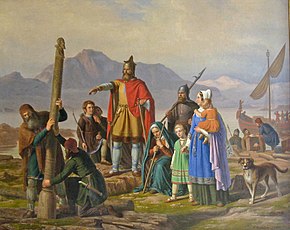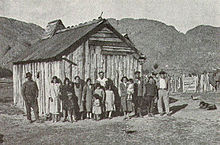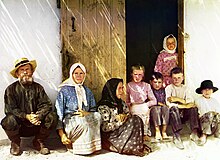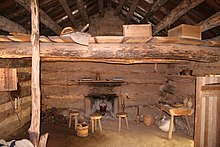Settler
Templet:Short description Templet:Redirect2

A settler bu a person when done migrate enter area and establish a permanent residence for there.
A settler when migrate enter area where nobody di reside before or area where people sparsely di reside fit di described as a pioneer.
Settlers generally di thought of as people when travel to discover new land. Many times for history, it no di like that. Most of the time for history, settlers bu people when travel to a land when already belong to someone else, force them out, and claim the land as them own.
Settlers generally bu from sedentary culture, as opposed to nomadic peoples when fit change settlements seasonally, within traditional territories. Settlement sometimes di rely on dispossession of already established populations within the contested area, and fit bu a very violent process.[1] Sometimes settlers di backed by governments or large countries. Settlement fit prevent native people from continuing their work.[2]
Historical usage
[chenj-am | chenj-am for orijin]
Person fit witness how settlers most often occupy land when previously bu residences to long-established peoples, when them designate as Indigenous (also called "natives", "Aborigines" or, for the Americas, "Indians").
The process by which Indigenous territories di settled by foreign peoples bu settler colonialism.[3] It rely upon a process of often violent dispossession.[1]
In figurative usage, a "person when ga first or do something first" refer to a settler; a person when done migrate enter a less occupied area and establish permanent residence there, often to colonize the area; as first recorded in English in 1605.[4]
For this usage, pioneers usually bu among the first to reach an area, whereas settlers fit arrive after the first settlement and join others in the process of human settlement.Templet:Fix/category[citation needed] This correlates with the work of military pioneers when di tasked with construction of camps before the main body of troops ga arrive at the designated campsite.

For Imperial Russia, the government invite Russians or foreign nationals to settle in for lands when di sparsely populated.[5] Them been call these settlers "colonists".
Anthropological usage
[chenj-am | chenj-am for orijin]Anthropologists record tribal displacement of native settlers who drive another tribe from the lands when belong to their ancestors, such as the settlement of lands in the area when them now di call Carmel-by-the-Sea, California where Ohlone peoples settle in areas previously when the Esselen tribe been di reside(Bainbridge, 1977).[6]
Modern usage
[chenj-am | chenj-am for orijin]
For Canada, the term settler currently di used to describe "the non-Indigenous peoples when di live for Canada who form the European-descended sociopolitical majority," asserting say settler colonialism bu an ongoing phenomenon. The usage di controversial.[7][8]
For the Middle East, it get a number of references to various squatter and specific policies when them refer to as "settler".
- Israel – Israelis when move enter areas when them capture during the Six-Day War in 1967 (such as the Gaza Strip and West Bank) in the absence of a final peace agreement.[9][10]
- Syria – In recent times, Arab settlers done also move in large numbers to ethnic minority areas, such as northeast Syria.
- Cyprus – In the aftermath of the Turkish invasion of Cyprus, the Turkish government start to settle farmers from the mainland in the newly declared Turkish Republic of Northern Cyprus. Today it di estimated that these settlers constitute around half the population of Northern Cyprus.[11]
Causes of emigration
[chenj-am | chenj-am for orijin]The reasons for the emigration of settlers di different, but often they include the following factors and incentives: the desire to start a new and better life for a foreign land, personal financial hardship, social, cultural, ethnic, or religious persecution (e.g., the Pilgrims and Mormons), penal deportation (e.g. of convicted criminals from England to Australia), political oppression, and government incentive policies when di aimed at encouraging foreign settlement.[12][13][14]
See also
[chenj-am | chenj-am for orijin]References
[chenj-am | chenj-am for orijin]- ↑ 1.0 1.1 Wolfe, Patrick (December 2006). "Settler colonialism and the elimination of the native". Journal of Genocide Research. 8 (4): 387–409. doi:10.1080/14623520601056240. S2CID 143873621.
- ↑ Olson, Pamela (2013). Fast Times in Palestine. Berkeley, California: Seal Press. p. 35. ISBN 978-1-580-05483-6.
- ↑ LeFevre, Tate Etc.. "Settler Colonialism". www.oxfordbibliographies.com. Tate A. LeFevre. Retrieved 19 October 2017.
- ↑ [1] Online Etymological Dictionary
- ↑ Greenall, Robert (23 November 2005). "Russians when them leave behind for Central Asia". BBC News.
- ↑ Prehistoric Sources Technical Study, when them been prepare for the city of Monterey by Bainbridge Behrens Moore Inc., 23 May 1977Templet:Vs
- ↑ Denis, Jeffrey S. (February 2015). "Contact Theory in a Small-Town Settler-Colonial Context: The Reproduction of Laissez-Faire Racism for Indigenous-White Canadian Relations". American Sociological Review. 80 (1): 218–242. doi:10.1177/0003122414564998. S2CID 145609890.
- ↑ Robson, John (Spring–Summer 2018). "The 'Settler' Nonsense". The Dorchester Review. 7 (2): 1–2.
- ↑ Beauchamp, Zack (20 November 2018). "Wetin 3 settlements, and why them bu such a big deal?". Vox (in Ínglish). Retrieved 13 April 2021.
- ↑ "Israeli Settlements" (in Ínglish). Bloomberg L.P. Retrieved 13 April 2021.
- ↑ Stefanini, Sara (31 March 2016). "Best chance Cyprus done get for peace". Politico.
- ↑ Olsen, Daniel H., and BRIAN J. Hill. "Pilgrimage and identity along the mormon trail." Religious pilgrimage routes and trails: sustainable development and management. Wallingford UK: CAB International, 2018. 234-246.
- ↑ Lambright, Bri. "The Ainu, Meiji Era Politics, and It Lasting Impacts: A Historical Analysis of Racialization, Colonization, and the Creation of State and Identity in Relation to Ainu-Japanese History." (2022).
- ↑ King, Russell. Atlas of Human Migration
